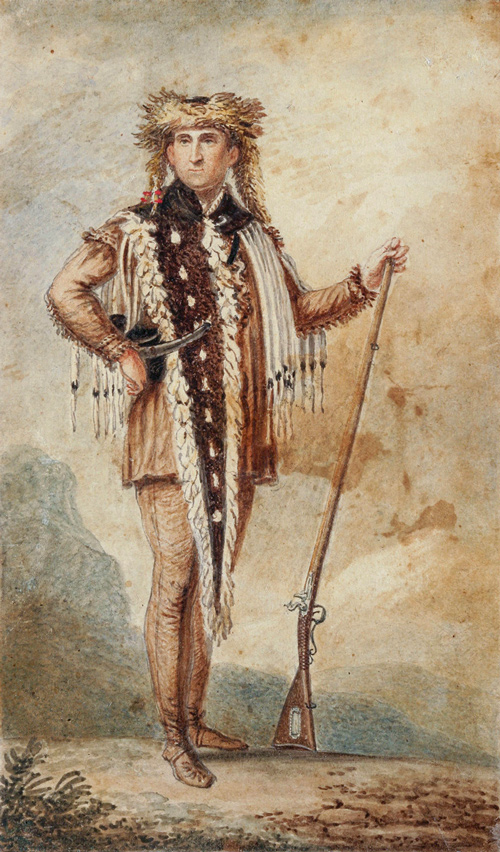In Washington City, Thomas Jefferson pens a letter to Benjamin Smith Barton announcing that Meriwether Lewis will lead an expedition to the Western Ocean. The President asks him to train Lewis in natural history, and in another letter, asks the Illinois governor to treat with several Illinois tribes to obtain land.
Lewis Wearing his Shoshone Tippet
Painting by Charles B. J. F. de Saint Mémin (1770–1852). Watercolor, black ink, and graphite with touches of red gouache on heavy paper, mounted on card, 6 1/8 x 3 3/4 in. (15.6 x 9.5 cm ). Gift of Ethel McCullough Scott, John G. McCullough, and Edith McCullough Heaphy, Courtesy New York Historical Society, emuseum.nyhistory.org/objects/42180/meriwether-lewis-17741809-in-frontiersmans-regalia.
Although William Clark was said to have considered this “an excellent likeness” of Lewis, the facial features seem graceless beside the better-known charcoal profile by St. Memin, or Charles Willson Peale‘s famous oil painting. See also The Lemhi Shoshones and Lewis’s Shoshone Tippet.
The Western Expedition
Washington Feb. 27. 1803.
Dear Sir
. . . . .
You know we have been many years withing to have the Missouri explored & whatever river, heading with that, runs into the Western ocean. Congress, in some secret proceedings, have yielded to a proposition I made them for permitting me to have it done: it is to be undertaken immediately, with a party of about ten, & I have appointed Capt. Lewis, my secretary, to conduct it.
It was impossible to find a character who to a compleat science in botany, natural history, mineralogy & astronomy, joined the firmness of constitution & character, prudence, habits adapted to the woods, & a familiarity with the Indian manners & character, requisite for this undertaking.
Th: Jefferson[1]Thomas Jefferson to Benjamin Smith Barton, 27 February 1803, Founders Online, National Archives, founders.archives.gov/documents/Jefferson/01-39-02-0499. [Original source: The Papers of Thomas … Continue reading
No Regular Botanist
altho’ no regular botanist &c. he possesses a remarkeable store of accurate observation on all the subjects of the three kingdoms, & will therefore readily single out whatever presents itself new to him in either: and he has qualified himself for taking those observations of longitude & latitude necessary to fix the geography of the line he passes through.
Th: Jefferson[2]Ibid.
Natural History
in order to draw his attention at once to the objects most desirable, I must ask the favor of you to prepare for him a note of those in the lines of botany, zoology, or of Indian history which you think most worthy of enquiry & observation. he will be with you in Philadelphia in two or three weeks, & will wait on you and recieve thankfully such a paper, and any verbal communications which you may be so good as to make to him. I make no apology for this trouble, because I know that the same wish to promote science which has induced me to bring forward this proposition, will induce you to aid in promoting it.
Th: Jefferson[3]Ibid.
Buying Illinois Tribal Lands
Washington Feb. 27. 1803.
Dear Sir
. . . . .
the Kaskaskias being reduced to a few families, I presume we may purchase their whole country for what would place every individual of them at his ease, & be a small price to us. say by laying off for each family wherever they would chuse it as much rich land as they could cultivate, adjacent to each other, inclosing the whole in a single fence, and giving them such an annuity in money or goods for ever as would place them in happiness. and we might take them also under the protection of the US. thus possessed of the rights of these three tribes, we should proceed to the settling their boundaries with the Poutewatamies [Potawatomis] & Kickapoos; claiming all doubtful territory, but paying them a price for the relinquishment of their concurrent claim . . . .
for this purpose we have given you a general commission for treating. the crisis is pressing. whatever can now be obtained must be obtained quickly. the occupation of New Orleans, hourly expected, by the French, is already felt like a light breeze by the Indians.
I must repeat that this letter is to be considered as private & friendly . . . . I pray you to accept assurances of my esteem & high consideration.
Th: Jefferson[4]Thomas Jefferson to William Henry Harrison, Founders Online, National Archives, founders.archives.gov/documents/Jefferson/01-39-02-0500. [Original source: The Papers of Thomas Jefferson, vol. 39, 13 … Continue reading
Notes
| ↑1 | Thomas Jefferson to Benjamin Smith Barton, 27 February 1803, Founders Online, National Archives, founders.archives.gov/documents/Jefferson/01-39-02-0499. [Original source: The Papers of Thomas Jefferson, vol. 39, 13 November 1802–3 March 1803, ed. Barbara B. Oberg (Princeton: Princeton University Press, 2012), 588–589]. Also in Donald Jackson, ed. Letters of the Lewis and Clark Expedition with Related Documents: 1783-1854, 2nd ed. Urbana: University of Illinois Press, 1978), 16–17. |
|---|---|
| ↑2 | Ibid. |
| ↑3 | Ibid. |
| ↑4 | Thomas Jefferson to William Henry Harrison, Founders Online, National Archives, founders.archives.gov/documents/Jefferson/01-39-02-0500. [Original source: The Papers of Thomas Jefferson, vol. 39, 13 November 1802–3 March 1803, ed. Barbara B. Oberg (Princeton: Princeton University Press, 2012), 589–593.] |
Experience the Lewis and Clark Trail
The Lewis and Clark Trail Experience—our sister site at lewisandclark.travel—connects the world to people and places on the Lewis and Clark Trail.
Discover More
- The Lewis and Clark Expedition: Day by Day by Gary E. Moulton (University of Nebraska Press, 2018). The story in prose, 14 May 1804–23 September 1806.
- The Lewis and Clark Journals: An American Epic of Discovery (abridged) by Gary E. Moulton (University of Nebraska Press, 2003). Selected journal excerpts, 14 May 1804–23 September 1806.
- The Lewis and Clark Journals. by Gary E. Moulton (University of Nebraska Press, 1983–2001). The complete story in 13 volumes.


